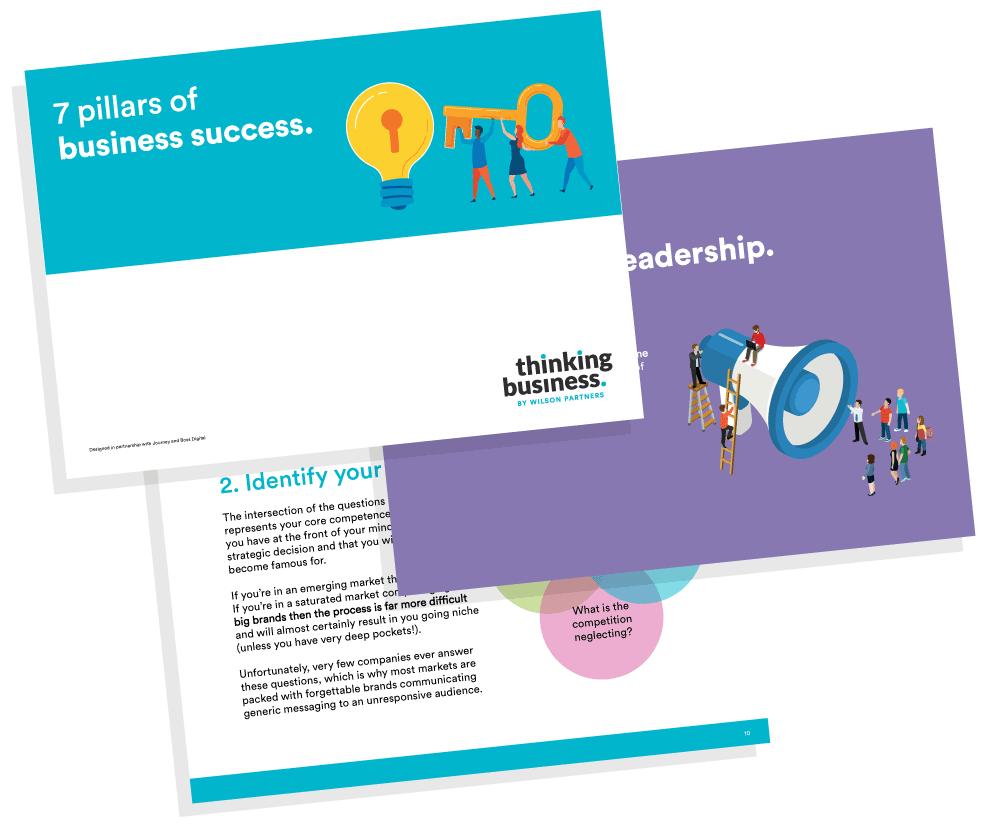
7 Pillars of Business Success, Part 3 – Building a Team
As a business leader, the single most important decisions you ever make will concern the people you hire and the investments you make in their development. Get this right, and you’re growth will know no limits. Get this wrong, and you’ll work 23 hours a day just to stand still.
This article outlines 12 key steps to building a world class team.
1. Prioritise your recruitment process
Let’s start with a simple one…
You must absolutely obsess over your recruitment process. As business leader of an expanding company, it should be your first, second and third priority.
2. Test for practical skills over academic prowess
Google refer to this as “Action over abstraction”. Can the candidate actually get stuff done or would they rather spend all day pontificating over strategy?
Your recruitment process should be designed to assess the former rather than the latter. You should incorporate practical tasks that ensure the person is world class at that one thing you need from them. It doesn’t matter whether they’re an administrator, sales person, marketer, bookkeeper, developer or director, there will be one or two basic skills that you require from day one, and your recruitment process should be designed to find people who possess that skill to an absurd degree.
There is simply no point interviewing 50 people to see how you “click”, without being certain that they are a world class performer.
3. Integrate your values throughout the process
As per your brand identity, your company will have a number of core values that need to be embedded in the day to day culture. Nowhere is it more important for these cultural mechanisms to exist than within the recruitment process. If one of your values is “taking ownership”, how will you ascertain if they’re the kind of person that takes ownership? Can they give lots of practical examples of where they have proactively sought greater ownership and responsibility in former roles?
Values are 90% determined by the people you hire and 10% by the mechanisms that exist once they are in their role. If you hire the right people the culture will become self policing. Hire the wrong people and you’ll spend your life in internal meetings trying to force people to become something they’re not.
4. Understand what “good” looks like
One of the common traits we find among leaders of high growth start-ups, is that they tend to have a high degree of insight into the roles performed by others. That is not to say that the CEO is also an expert salesperson, developer, operations manager and customer services assistant, but they ensure they know enough about the role to understand the challenges the person will encounter and what “good” looks like in that role. Without that, they cannot possibly judge the performance of either the person or the function, or understand how it needs to fit together with the rest of the business.
Naturally this becomes harder as the business grows, so the leader will need to distinguish between those functions that fall within the core competence of the business and those that are more peripheral.
5. Ask the right questions
Conventional leadership wisdom dictates that a great CEO should spend a significant proportion of time walking through the business, learning about the people, their lives and their roles. This is important, certainly, but it needs to be more focused than just having a natter. This is not about building rapport at a vague and superficial level. It is about actually getting to understand these people and their jobs, and that means asking insightful and challenging questions. Be prepared, take notes, and follow up.
6. Prioritise performance and clear thinking over seniority
The world’s most successful companies are built on performance. It shouldn’t matter if someone has been with you 10 weeks or 10 years, if they are demonstrating a clear rationale for their thinking, they should be listened to. And if they are demonstrating a consistent ability to execute, they should be rewarded.
Those that demand a seat at the table merely because of their job title or time spent with the company, on the other hand, need a polite reality check. It’s what they are contributing that counts.
7. Understand those roles that are motivated by intrinsic factors vs those that are motivated by extrinsic factors
It is generally assumed that if you offer people a financial reward for high performance, that they will improve their performance. This is true for some jobs, but absolutely not true for others.
Extrinsic factors narrow people’s focus, which works really well when there’s a clear process to be followed. If you want someone to bang out 200 sales calls in a day, offer them a monetary incentive. If you want them to populate data around the clock, again, offer them a monetary incentive.
However, not every task benefits from a narrowing of focus. Sometimes you want people to slow down and think laterally. This is where intrinsic motivators are far more powerful. If you are trying to get your team to be more creative or generate complex solutions to complex problems, offering a monetary solution is likely to be at best ineffective, and at worst counterproductive.
8. Encourage disagreement
If you hire smart, ambitious people, they will often disagree with one another. That’s okay. Disagreement should not be discouraged. It’s perfectly fine to have differences of opinion and nobody should feel too special, sensitive or senior to be challenged. Friction is good.
If anything, encouraging a culture where it’s okay to challenge and disagree can actually prevent grudges from developing. It also results in much smarter decisions being made.
9. Hire slow, fire fast
It’s a horrible expression and make no mistake – if you’re firing someone then it means you probably got something wrong at the recruitment stage. Firing affects peoples’ lives and is never to be taken lightly. While they’re with you, you have a moral imperative to do everything you can to support them and ensure they are able to succeed in their role.
However, if that’s the direction of travel, then you need to arrive there as quickly as possible. If you’re not happy with the person’s performance in week 3 then you’re not going to be happy with their performance in month 3. Don’t drag it it out. It doesn’t help them, you or their colleagues.
On the other hand, when hiring, you should give yourself bags of time. It will always feel like you need the person yesterday (hence why you’re hiring) but under no circumstances can you cut corners and rush the process. You will spend the next year regretting it.
10. Come up with practical measures to embed your culture
95% of companies now have a piece of paper printed with the word “Values” at the top of it. Sadly, for many companies, that piece of paper will sit tucked in a drawer somewhere, or perhaps they’ll find their way onto a wall or integrated within some quirky inspirational imagery scattered around the office.
This is all good stuff but how is it actually impacting behaviour? If you want these values to become the culture then there needs to be some very specific mechanisms designed and integrated into your day to day operations. For example:
- Performance reviews – how are your values tied into your performance reviews? How do they impact pay?
Working arrangements – if you want your people to use their initiative, work hard, be responsive to unexpected events and take ownership, then this is a two way street. What are your policies around flexi-time, holiday caps, charity work and work from home days?
- Team meetings – how are your values built into your internal meetings? If they really count for anything then they should play a key role in how routine meetings are structured.
- Social events – getting away from the office and having fun is such a key aspect of building a culture, but it’s also a great opportunity to reinforce the key values. Think about how you can tie your core values into these activities.
11. Rockstar performers aren’t exempt from the rules
Of all the rules around building great teams, perhaps the most difficult is knowing how to deal with great performers who undermine the culture. How tolerant should you be of these people? How far should you allow them to bend the rules so that the company doesn’t lose their financial contribution?
The answer is, not at all. While your goal should be to hire the best of the best, nobody can be above the company’s values.
This is really difficult when the person is absolutely smashing their responsibilities, particularly if they’re revenue generating, but the damage they are doing to you is real and could be irreparable. They need to go.
As with anything in business, developing great teams is highly subjective and there may be principles on this list that you feel don’t quite fit your culture. That’s fine, but if there is one thought you take away from this article it should be this – however much time you are currently spending on your people, particularly the recruitment process, double it. And then double it again.
It’s a cliche but people really are your single greatest asset and everything else in your business will ultimately be a product of this investment.
Event
Webinar – Changes to the UK Trust Registration Service, May ’22
A short webinar and Q&A session with our Trust specialists Jodie Green and Sara Pedrotti. You can view the video and download the presentation here.

Download our free guide to the 7 pillars of business success
Read our free guide what you need to focus on to help you make better decisions and achieve your goals quicker.
Please complete our form to download the guide.
Sign up to receive alerts
Call us on 01628 770 770 for a no-obligation chat
You may also be interested in...
Business advisory step one: strategy day
Here at Wilson Partners, we look at more than the numbers. Our Business Advisory Team will help you understand what they actually mean and what is…
Business advisory: the secret to SME success
SMEs provide services across a range of industries, contributing significantly to innovation, job creation and economic growth – and that’s why we…
Your tax allowances for 2024/25
With the new tax year in full swing, make sure you're aware of the tax allowances for 2024/2025! Pension annual allowance The pension allowance…



 Working arrangements – if you want your people to use their initiative, work hard, be responsive to unexpected events and take ownership, then this is a two way street. What are your policies around flexi-time, holiday caps, charity work and work from home days?
Working arrangements – if you want your people to use their initiative, work hard, be responsive to unexpected events and take ownership, then this is a two way street. What are your policies around flexi-time, holiday caps, charity work and work from home days?


